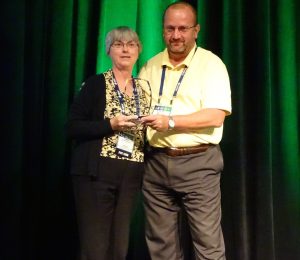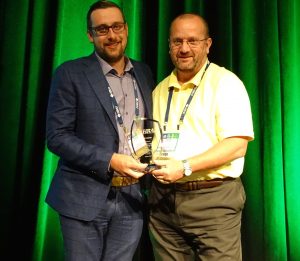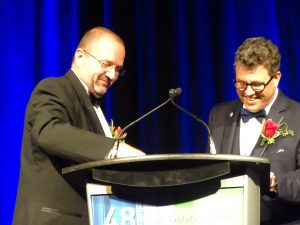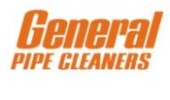
Proactive approach sets tone for HRAI’s 48th annual conference
October 21, 2016 | By Kerry Turner

Nancy McKeraghan of Canco Climatecare Heating and Air Conditioning accepts the award of merit from Peter Steffes, 2015-2016 HRAI chair.

Norm Mierkalns received a merit award (posthumously). His son Mark (l) accepted the award from Peter Steffes, HRAI 2015-2016 chair.
The Heating, Refrigeration and Air Conditioning Institute (HRAI) held its annual conference August 24 to 26 at the Hyatt Regency in Calgary, AB. Themed Making Every Connection Matter, the event opened with a Year in Review presentation.
While reviewing material for Year in Review, HRAI president Warren Heeley “noticed a common thread and that was change. Positive change, the kind that propels the association forward.”
That is evident in current HRAI initiatives. The organization is expanding its work in the ICI industry and is taking a more comprehensive approach to building its membership, reported Heeley. He went on to say that among the most positive developments to date is the harmonizing of standards between Canada and the U.S.
“Amendment 13 and a commitment to revise Amendment 14 are both big steps to harmonization,” said Heeley.
Refrigerant Management Canada, has also been the beneficiary of positive developments with the passing of P2 (Pollution Prevention) planning on May 21, 2016. The Minister of Environment published a notice under Part 4 of the Canadian Environmental Protection Act, 1999 (CEPA 1999) requiring the preparation and implementation of Pollution Prevention Plans in respect of halocarbons used as a refrigerant. An industry-led environmental care program, RMC is a not-for-profit corporation established by HRAI and the Canadian refrigeration and air conditioning industry. RMC facilitates the responsible disposal of surplus ozone depleting refrigerants from the stationary refrigeration and air conditioning industry.
He went on to report that Switch the Stat, the thermostat recovery initiative administered by the association, will be ongoing and has been rebranded as the Thermostat Recovery Program (TRP).
Prior to turning the mic over to Martin Luymes, HRAI director programs/relations, Heeley said, “We [HRAI] will continue to operate outside our comfort zone. This provides the foundation for the conference.”
That zest for change and positive, forward reaching results was reflected in Luymes’ presentation. Among the points mentioned by him were plans to implement codes and standards webinars for the manufacturer division and a wholesalers education plan, and an investigation of e-commerce options with the Canadian Institute of Plumbing & Heating and Heating, Air-conditioning and Refrigeration Distributors International (HARDI).
In terms of the contractor division Luymes discussed the implementation of strategic plan elements, a new approach to regional support staffing, which includes the hiring of a full-time support staff person in Alberta, and tracking of member advantage programs.
Key policy issues identified by Luymes for the coming year include the federal and provincial climate change agenda and the low carbon economy, refrigerant regulation and new refrigerants, harmonization of codes and standards, trades training and apprenticeship, issues with utility competition and consumer protection.
“Challenges are intermingled with opportunities–there’s never a dull moment,” concluded Luymes.
Training was a recurring issue over the three-day event particularly during Andrew Stapleford’s presentation titled The Move to Low GDP Refrigerants. Stapleford, who is with Emerson Climate Technologies, explained the growing popularity of CO2 and the safety implications for contractors working with this natural refrigerant. Despite its environmental appeal, contractors must be aware of CO2 systems’ high pressure, high triple point; the danger of asphyxiation; moisture is a concern; and concerns in the event of a power outage and resumption of power which call for a staged effect to avoid fluid flow back.
Heeley questioned training given all of the changes. “How do they fit everything into the curriculum?” asked Heeley. “It becomes a safety issue–it appears that what qualifications the service tech has will become a bigger and bigger issue and will have to be addressed.”
Dennis Kozina of Emerson agreed. “I bet there’s not a lot of the final refrigeration tech papers that refer to CO2,” said Kozina.
Stephen Yurek, president and CEO of AHRI, agreed, “big changes are coming.” He questioned, “Why it takes so long to adapt safety standards?” Yurek noted that change as a result of restrictions takes a long time to get into building codes.
“Safety is what is important, if it doesn’t come up in the environmental side, there is a disconnect,” said Heeley.
A challenge faced by HVAC advocacy organizations is the provincial approach to climate change. “When you start to look at the patchwork quilt that our industry would have to deal with, it is a huge concern,” said Heeley. “There are so many different issues you have to have some federal strategy to deal with this.”
In addition to this, and other sessions supporting the tone set by the review, the conference included division meetings, the AGM and awards presentations. HRAI will hold its 2017 conference August 16 to 18 in Quebec City, QC.
See HPAC October for more photos and information on the meeting.





